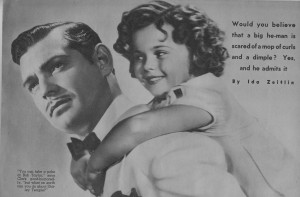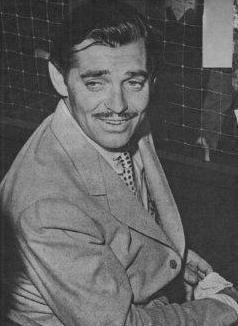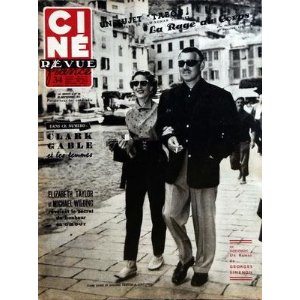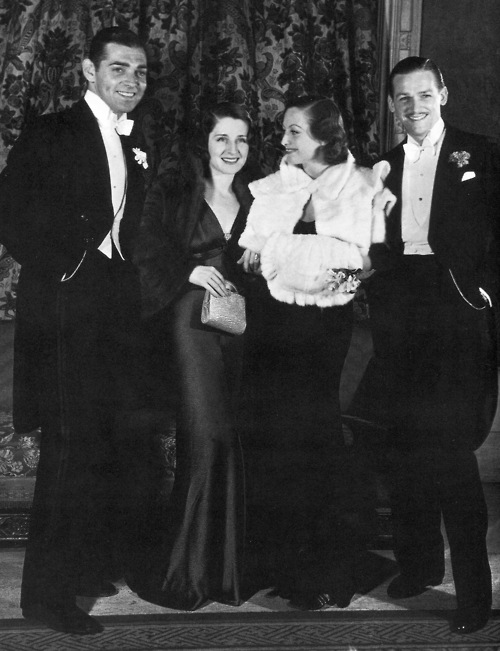{New Article} 1937: Gable Fears Shirley Temple!

This is a strange little piece written for Modern Screen magazine in 1937. In the late 1930’s, Clark was certainly considered “the King of Hollywood” but his box office was exceeded by a certain little curly-topped hoofer.
“Sure I’m afraid of Shirley Temple,” he agreed solemnly. “She haunts me. I can see her sitting up there, shaking her curls and twinkling her eyes at me. I can almost hear her: ‘Hey man down there, come on up and catch me.’ But I’m not playing tag with Shirley. I know my place. And mighty grateful that it’s even second.”
Clark seems to be taking the whole interview very lightly. He was not one to really care about box office receipts or being surpasses by anyone.
“Isn’t it bad enough to be pushed around by an eight-year-old without shouting it from the housetops? You want me to call attention to the fact that a pint-size youngster has me stopped? There she stands, three foot something or other, and holds the fort. You can’t crawl ‘round her, and you can’t climb over her. If it were Bob Taylor now, you could at least take a poke at him. Not that it would do any good, but just for the hell of it. But Shirley, what could you do with her? She’d lift those lashes and smile that smile, and she’d have you licked, same as the rest of ‘em. ‘Take it away, lady, it’s all yours,’ that’s what you’d say, knowing darn well you weren’t giving her a thing she didn’t have snug and tidy in her pocket already.”
He even said he’d play a role with her, if he’d have the chance. Now that would have been rather interesting…
“Sure I’d play with Shirley if I got the chance. A man doesn’t shy off just because he’s scared. I might shake and shiver, but I’d face the music and go down with my boots on. Make no mistake about that. I’d go down all right. Even a good actor like Frank Morgan had to stay on his toes every minute he was playing with her. She’s not just a cute youngster.” And here he turned serious. “If it were just that, there’d be plenty of other cute youngsters to take her place. Well, can you figure anybody taking Shirley’s place? People on the set have told me how she handles herself, how she never blows up, how she’s got the technique of her hob at her little fingertips. I’d probably find myself rehearsing in front of a mirror, trying to keep up with her. I’d probably learn plenty from her, too. I have—from all the women I’ve worked with—Loy, Garbo, Shearer, Lombard, top-notchers, the lot of ‘em. Be kind of fun, at that, to go to school to No. 1.
The article is rather silly, as Clark laments how Shirley looks better in a frilly dress than he would:
When we started ‘Parnell’ there was some talk of a beard. We compromised on sideburns. With Shirley, the question would never come up. If it did, she’d laugh and stick it on and think was some fun new kind of game she was playing. What’s more, she’d look just as sweet with that face of hers poking out over it. Well, the beard would look just as funny on me, but the face would take punishment. And then there’s clothes. Put Shirley in a frilly dress, and she looks grand. Put her in overalls and she looks just as grand. Put me in a frilly dress and see how I look. I just don’t have the range.
After it’s been established that he can’t complete with Shirley in the filly-dress-and-curly-top department, the article strangely veers into what Clark’s plans on for the future. At this point in his life, he was separated from Ria and cavorting around town with a certain Miss Lombard, though nobody knew yet if this was the real thing or one of those brief Hollywood dalliances. It’s interesting, though, nearly two years before he moves into his beloved Encino ranch that would be his home the rest of his life, how it seems to fit the bill of what his ideal home would be:
The house could be almost anything that was practical and comfortable. Only not Spanish; I don’t like Spanish architecture. Early American, maybe; and one story. I don’t go for two-story houses. And not to run over ten thousand dollars. I’d have gas and electricity and all those things put in. I don’t care for the fancy stuff, but I do like a certain amount of comfort.
There’d be one big living room, probably running the entire length of the house, with a huge fireplace at one end, the kind you could get a good big log into. I might almost make it a combination living room, dining room and playroom.” He was warming to his theme now, as the house grew under his eyes, eager as a boy’s. “You could sort of whisk the dining room away, when you’d finished eating, like those fellows in the fairy tales. I’d do the whole room in knotty pine, with a ceiling of big timbers, and instead of board floors, I’d have this time you can throw rag rugs down on. So if you’re out riding, you can come in with mud on your feet, and so can your dogs, and you don’t have to worry about what’ll happen to the Oriental carpets. Just run a mop over it, and there you are.
I’d like plenty of gay color around, but none of this wild stuff—what do they call it? Surrealist? Can you make heard or tail of it? No? Me, too. Oh, and brass; I like brass bright and shining by the fireplace and anywhere else I can stick it.
Not over three bedrooms; a couple for my friends, because the latchstring would always be out. Not too big a kitchen; and a cellar under the whole house. Where I could store things like potatoes and apples. Bathrooms are the one thing I might go haywire on. Probably spend more money on them than the rest of the house put together. I hate a shower that sprays out a measly trickle or two and stops. I want them full, with lots of pressure behind them, so they make you sting.
I’m not sure how the water pressure was on the ranch, but the rest of that pretty much sounds right on. It’s funny, but every article/interview with him from 1936-1938 generally has him talking about how he will be shoved out of the movie business and how he’ll be okay with that and just spend his time farming and leading a simple life. In several articles from that time period, he talks about exactly how much money he figures he can live on after he’s done with movies, or rather, after the movies are done with him. It’s so modest, and so very un-movie-star-like, for a man at the top of his game to repeatedly worry and talk about how when he’s forced to leave the business.
Will I miss the movies? Well, you see, I’m just a farmer at heart. I’ll be building fences, pruning trees, making improvements, working out my horses. I’ll be too busy to miss anything—even Shirley.
Read the article in its entirety in The Article Archive.


